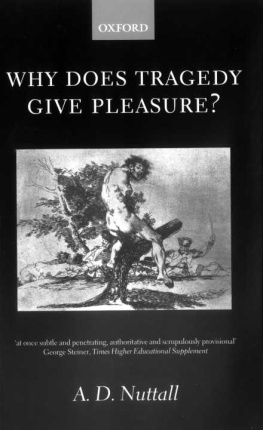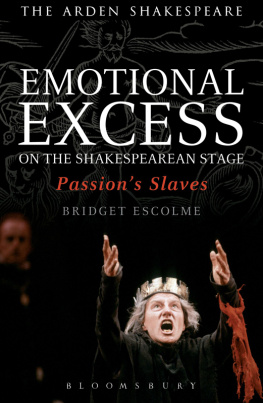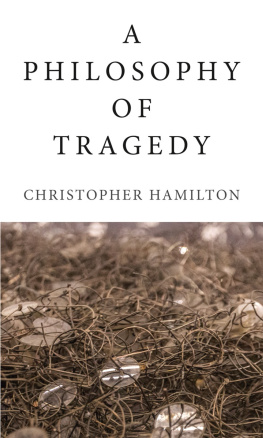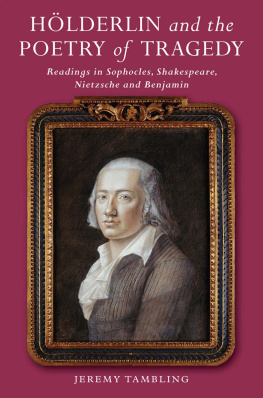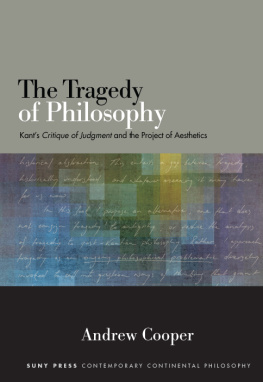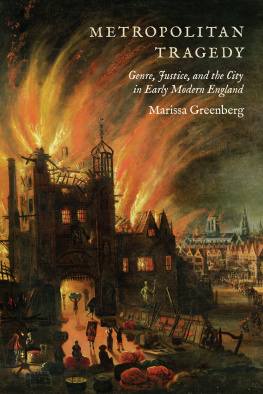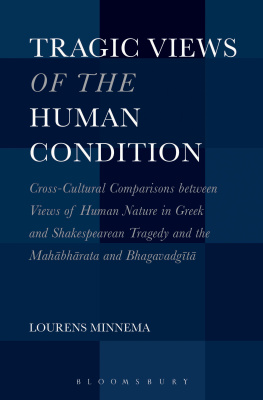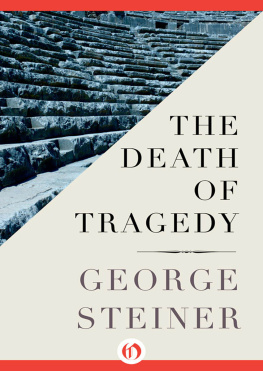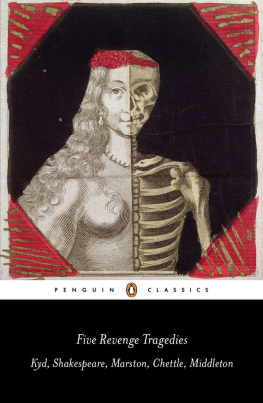Why Does Tragedy Give Pleasure?
Why Does Tragedy
Give Pleasure?
A. D. NUTTALL




Et dolet et specto; iuvat et spectasse dolendo
Milton, Elegia Prima
PREFACE
This short book was once, so to speak, even shorter. It began when I received a letter from Karl Miller inviting me to give the Northcliffe Lectures for 1992 in University College, London. Those three lectures have now grown into four chapters. My disagreement with Martha Nussbaum over the meaning of the word catharsis in Aristotle, offered far too lightly in the lecture hall, is now argued in detail. Nussbaum's book, The Fragility of Goodness, is itself written with so much force and fairness of mind that any dissent is obliged to present itself with care. The section on Freud is now more carefully shaded, more guarded than the original few paragraphs. Despite these protestations, some readers will inevitably say that really a great deal more care, more detail is required for so large a subject. It will be obvious that I have chosen to retain the general form of a brief lecture series, to write an essay in which, unsubduably, the voice of a live speaker is still occasionally audible, rather than to attempt an exhaustive treatise.
Stephen Halliwell, whose views were misrepresented in the first edition of the book, generously drew my attention to various mistakes. One reader of my manuscript felt that I ought to say more about French tragedy; I thought myself that I ought to be saying more about Hume. I could have remedied both these defects but the result, I believe, would have to be a retardation and blurring of what is still, as things stand, a unified argument.
I have been helped by people in lecture halls whose names I do not know, by friends, by the admirable, anonymous persons who read manuscripts for the Oxford University Press, by William Race of Vanderbilt University, and above all by Anthony Storr, who responded swiftly to all my queries with both sharpness and humanity. The surviving errors are of course mine, not his.
The third chapter, `The Game of Death', appeared (without its apparatus of notes and references) in The London Review of Books, 1 1 June 1992.
A.D.N.
New College, Oxford
CONTENTS
1
ARISTOTLE AND AFTER
If we were all wicked, there would perhaps be no problem. A world of torturers would naturally be pleased by the blinding of Oedipus or else, to take a cooler form of wickedness, it would not be surprising if an audience inwardly driven by envy were to delight in the fall of one greater than they. But why does tragedy give pleasure to `people like ourselves'?
A cruel or sadistic pleasure in the blinding of Oedipus is immediately distinguishable from what Aristotle called the oikeia hedone, `the proper pleasure' of tragedy (Poetics, 1459 a 2 1) and I fancy that the same is true-though less obviously true-in the case of the gloating, envious spectator. In the tragic theatre suffering and death are perceived as matter for grief and fear, after which it seems that grief and fear become in their turn matter for enjoyment.
`The pleasure of tragedy' is an immediately uncomfortable phrase. Quite apart from the original basic collision between terrible matter and a delighted response, there is an awkwardness, somehow, in the very mildness of the term 'pleasure'-it seems a puny word to set beside the thunderous term `tragedy', adding a species of insult to injury. The Nietzschean oxymoron, `tragic joy' is, oddly, easier to accept, because it fights fire with fire. I suspect moreover that the awkwardness has become more obvious in our century. For moral Dr Johnson it was self-evident that poetry and drama must please. A later kind of moralism taught a new generation of readers and theatre-goers to despise the pleasurable and to value the disturbing, the jagged, the painful work. It is now virtually unimaginable that a reviewer of a new play should praise it by saying that it offers solace or comfort. Conversely the adjective `uncomfortable' is automatically read as praise. Ancient Stoics and Epicureans argued about most things but they would be united in their bewilderment at this. I am a twentieth-century person and I share the general taste for discomfort. But the radical problem remains obstinately in place: if people go again and again to see such things, they must in some way enjoy them. Similarly, if you like the disturbing kind of play then this disturbance is something you like, must itself be a further mode of pleasure. The shift in taste does not resolve the problem of tragic pleasure; rather it sets an allied, similarly challenging problem-that of enjoyed discomfort-alongside it.
Whether we go for a Rylean exclusion of pleasure-consciousness or a quasi-Humean relegation of such consciousness to the fringes of awareness, it is clear that intense enjoyment is compatible with a mind dominated by objects in themselves neutral. Some objects-sexobjects, say, or food-objects-are so regularly linked with pleasure as to cause the distinction I have offered to disappear; we would find it easy and natural to say that the small boy eating Christmas pudding is immediately conscious of pleasure even if his inner preoccupation is as adequately represented by the word `pudding' as it is by the word `pleasure'. Enjoying a game of chess, on the other hand, seems not to yield the same, almost automatically fused, result. `White Queen to Queen's Bishop's 4th' is not immediately charged with the pleasure message in the way Kevin Costner, say, is for some people or Newcastle Brown Ale for others.
If, then, more neutral objects-that is to say, objects which are not seen as themselves constituting `pleasures'-may be admitted to a dominant place in the subject's consciousness without any necessary diminution of that subject's actual pleasure, it becomes a little easier, perhaps, to think that pleasure may lie as much in some concomitant action or process as it does in the brightly illuminated area of consciousness.
It rather looks as if Aristotle's explanation of our enjoyment of tragic suffering and death is an answer of this kind. In that extraordinary surviving sheaf of lecture notes or lecture handouts dating from the 4th century BC called the Poetics, we find one of the first theories of social psychology. The Greek is crabbed and elliptical; one can sometimes hear the testy accent of the crotchety teacher-hoper eiretaipol- lakis (1456 a 10-11), `as I have told you many times'. We also become aware as we read of a double rhetoric. Aristotle is teaching the young and, simultaneously, he is arguing with his own dead teacher, Plato. I have some sympathy with him: I spent the first ten years or so of my adult life arguing in my head with the man who taught me Latin and Greek at school. The story of the difference between Plato and Aristotle over poetry is a familiar one, so I will try to make it short. Plato, whom we know to have been a superb poet, feared poetry and would not permit it in his ideal commonwealth. It is important to remember that the banishing of the poet is described by Plato not coolly but with evident grief.
If one should come to our city [he wrote] who has power to become anyone, to represent all things, wishing to show himself and his poems to us, we will kneel to him as to a sweet, holy and wonderful being and will tell him that he and his kind have no place, according to our law, in our city. And so, having anointed him with myrrh and crowned him with flowers, we shall send him away to another city.

